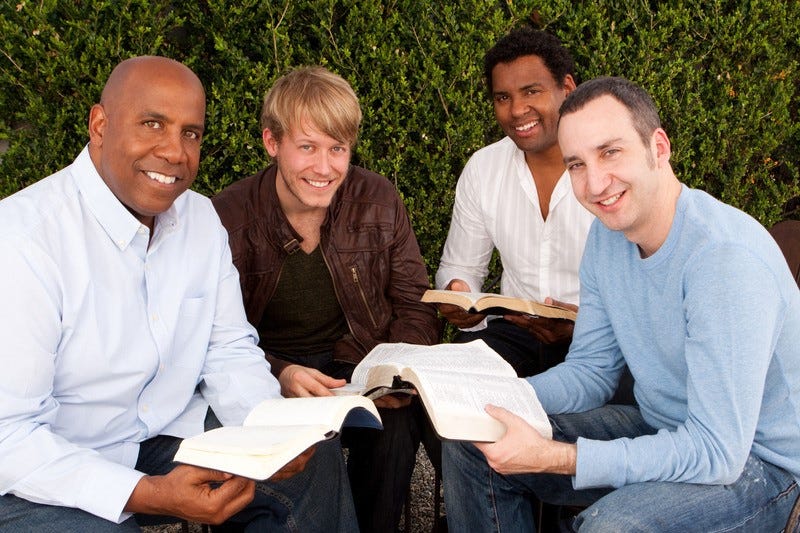Building Strong Disciples Through Small Group Bible Studies
A Look at Making Disciples
Dear Brothers and Sisters in Christ,
I’m always astonished when I come across a church that does not have any small groups or Bible studies in place. In a time when “small groups” has become a buzzword and a focal point in countless books, seminars, and conferences, it seems almost unthinkable. While the Bible doesn’t explicitly command us to “go into all the world and create small groups,” it’s undeniable that these gatherings are a powerful and effective way to make disciples who will endure in their walk with Christ.
John Wesley, the spiritual father of our Methodist tradition, certainly believed and practiced this. His methodical approach to discipleship, through class meetings and societies, laid a foundation that has stood the test of time. As Wesley himself said, “The gospel of Christ knows of no religion, but social; no holiness, but social holiness.” Wesley understood that we are created for community and that we grow in community. In his wake, many have come to realize that the Christian life was never meant to be lived in isolation. Just as Bach’s harmonious compositions require the interplay of multiple instruments to create their full and glorious sound, so too do we require the fellowship of others to fully flourish in our walk with Christ.
The Primacy
As a Minister of Discipleship, I have often been asked how to start a small group ministry, a men’s group, or a Bible study. There are many practical suggestions one could offer - Steve Manskar’s Accountable Discipleship and Kevin Watson’s Blueprint for Discipleship are excellent resources on the topic. However, my default response always remains the same: Stick to Scripture.
While fellowship, accountability, and prayer are vital components of any small group, they must all be rooted in the Word of God. Without Scripture as our foundation, we risk becoming like the religious leaders Jesus rebuked in Matthew 22:29, who were in error “because [they did] not know the Scriptures or the power of God.” Our aim in small groups is to make disciples who not only know Christ’s commands but also understand who he is and how to live out those commands in their daily lives.
Just as C.S. Lewis observed that if we pursue God first, everything else falls into place, the same is true for our small groups. When we make the study of God’s Word our priority, we create space for the Holy Spirit to work, transforming lives in ways that go beyond our understanding.
The Practice
In my own experience, I have found that the most spiritual growth occurs in groups that dive deep into the text, studying the Bible verse by verse, chapter by chapter. This method, though seemingly simple and unremarkable, is profoundly effective. The Bible is, as we often say, timely and timeless. It does not need us to make it relevant; rather, it requires faithful shepherds who will guide their flock through it, helping them see its eternal truths and applying them to their lives.
The author of Hebrews reminds us that “the word of God is living and active, sharper than any two-edged sword” (Hebrews 4:12). It has the power to penetrate the depths of our hearts, revealing our innermost thoughts and intentions. No topical study or popular book can claim such authority. Therefore, our small groups must remain anchored in Scripture, trusting in its power to convict, correct, and equip us for every good work (2 Timothy 3:16-17).
The Promise
To paraphrase Lewis once more, if we seek God and his kingdom first, all our other needs will be met as well. The same holds true for our small groups. When we focus on studying God’s Word together, we find that he meets not only our spiritual needs but also our relational and emotional ones. In doing so, he knits us together as a community, much like the beautiful and intricate harmonies found in a Bach cantata - each note, each voice contributing to the whole in a way that is both unique and indispensable. (Can you tell I’ve been learning more about Bach recently?)
So, as you consider starting or revitalizing a small group, let the Word of God be your guide. It’s the sure foundation upon which all true discipleship must be built. And remember, we’re never alone in this journey. God has promised to be with us, guiding and sustaining us through his Spirit, as we seek to know him more deeply and help others do the same.
Your brother in Christ,
Dale
Thank you for taking the time to read this word of encouragement and direction. I hope it has encouraged and challenged you in your walk with Christ. If you found this message helpful, I invite you to share it with others and encourage them to subscribe to Walking Points. Together, let’s continue to grow as faithful disciples of our Lord Jesus Christ.


